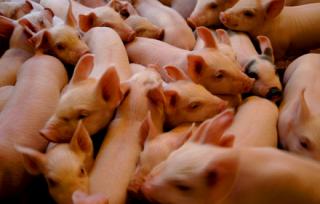
Big Sky, based in Humboldt, Saskatchewan, produces about 1 million hogs a year, generating about 40% of the Canadian province's annual production. It ranks as Canada's No. 2 producer with operations on both sides of the U.S.-Canada border.
Executives at the privately held firm weren't immediately available to comment Wednesday. Kevin Brennan, a senior vice president at Ernst & Young LLP, Big Sky's designated receiver, confirmed the company's receivership status.
"Given where the price of feed has gone in the market and the futures price with respect to hogs, it created a liquidity crisis for the company," Mr. Brennan said.
The financial distress at Big Sky underscores the devastating knock-on effects this year's draught has had on all sorts of farmers. After bone-dry conditions damaged crops across the U.S. farm belt and Great Plains, costs for livestock feed supplies like corn and soy meal have hit all-time records. Corn futures at the Chicago Board of Trade are up 42% since the beginning of June, upending forecasts earlier this year--before the drought set in--that projected affordable feed costs and profitable conditions for raising hogs for pork. Meanwhile, hog prices are trading near two-year lows, hurt by weak demand in the U.S. and rising supplies, while farmers thin herds to reduce feed costs.
Saskatchewan pig farmers are expected to lose between 30 Canadian dollars (US$30.83) and C$40 between September and April on each hog sold, said Neil Ketilson, general manager of the Saskatchewan Pork Development Board, a provincial industry group. "That's big bleed," Mr. Ketilson said.
U.S. farmers may end up losing as much as US$60 a head by the fourth quarter of the year, according to Chris Hurt, an agricultural economist at Purdue University.
The Canadian Pork Council last month said it had joined with the federal government to identify measures to help farmers. Washington has already intervened to support pork prices, saying last month it planned up to US$100 million in government purchases.
As the receiver, Ernst & Young is now charged with overseeing Big Sky's operations, and can borrow money to continue to feed the pigs and pay employees while it seeks a buyer. Mr. Brennan said he believes finding a buyer is "very realistic," saying Big Sky is considered one of the most efficient operators in the industry.
Market reaction to Big Sky's troubles has been muted so far. Analysts expect a buyer for Big Sky to emerge, in keeping with patterns from previous crises in the hog-farming industry. In the past, "the pork industry has been eager to fill those barns with someone else's hogs," said Rich Nelson, director of research at brokerage Allendale Inc.





